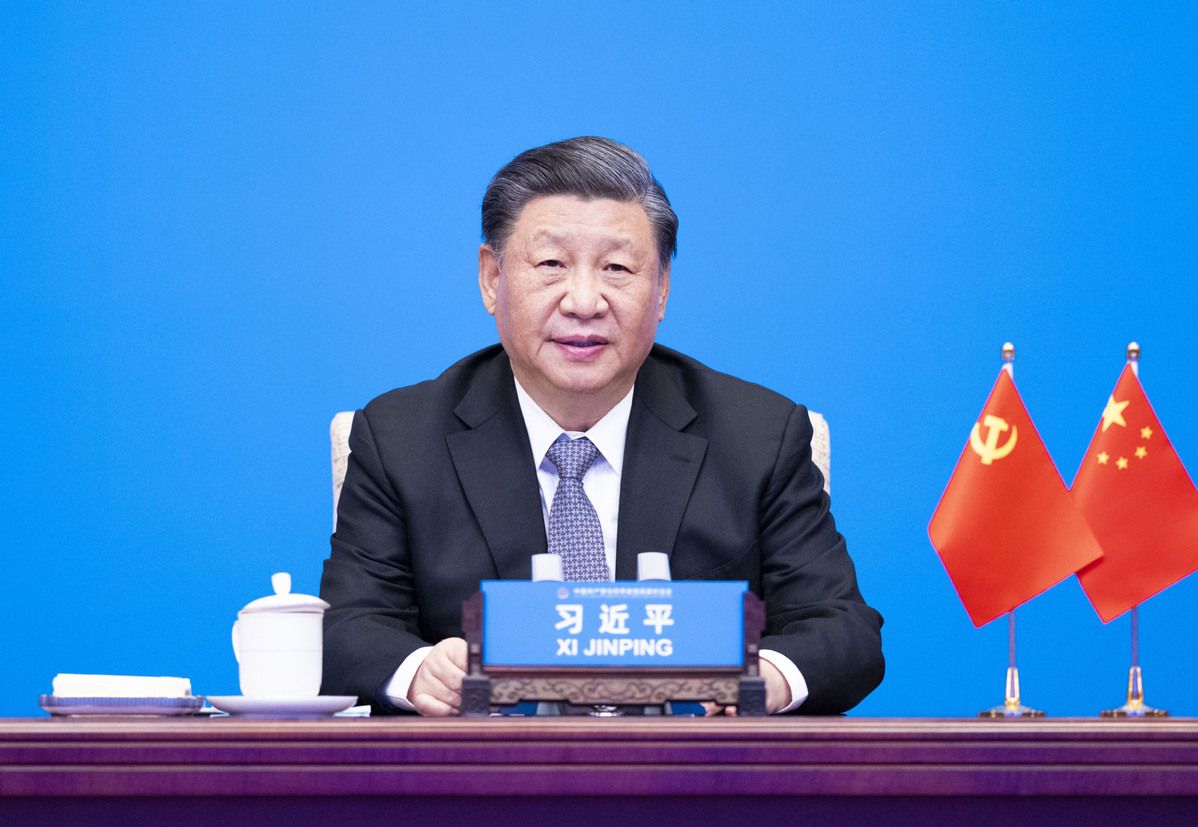




Xi Jinping, general secretary of the Communist Party of China (CPC) Central Committee and Chinese president, attends the CPC in Dialogue with World Political Parties High-Level Meeting via video link and delivers a keynote address in Beijing, capital of China, March 15, 2023. [Photo/Xinhua]
Initiative: Cultural diversity emphasized
Leaders of political parties and organizations from around the world have hailed the China-proposed Global Civilization Initiative, saying that it has great relevance, together with the Global Development Initiative and Global Security Initiative, to building up countries' consensus on addressing mounting global challenges in terms of peace, security, development and harmonious coexistence.
Their comments came as Xi Jinping, general secretary of the Communist Party of China Central Committee, unveiled the Global Civilization Initiative on Wednesday at the CPC in Dialogue with World Political Parties High-Level Meeting. The meeting's theme was "Path Towards Modernization: the Responsibility of Political Parties".
The initiative calls for respect for the diversity of civilizations, upholding the common values of humanity in pursuing peace, development, equity, justice, democracy and freedom, and promoting robust international people-to-people exchanges and cooperation.
Political leaders who took part in the virtual meeting spoke positively about Xi's initiative and expressed their willingness to work with the CPC to play a guiding role in promoting exchanges and mutual learning of civilizations and pursuing a path toward modernization based on their own national contexts.
South African President Cyril Ramaphosa, who is also the president of the African National Congress, the ruling party of South Africa, said that he fully agrees with Xi's initiative.
The history of South Africa in struggling for national independence makes its people value the importance of unity, harmony, inclusiveness and mutual respect, he said.
The initiative is particularly important considering the destructive challenges that the world is facing, such as climate change, the COVID-19 pandemic, terrorism and geopolitical confrontation, Ramaphosa added.
He also said that South Africa appreciates China's foreign policy based on noninterference in domestic affairs and mutually beneficial cooperation, which are reflected in China's global initiatives and are crucial to promoting the collective growth of developing countries.
Serbian President Aleksandar Vucic, also president of the Serbian Progressive Party, said that the world is expecting China to provide innovative solutions to coping with challenges amid the complex changes of the international landscape.
Vucic said humanity should work together to advocate the diversity of cultures and civilizations.
The Serbian president also said, echoing Xi's speech on Wednesday, that nations should uphold the principles of equality, mutual learning, dialogue and inclusiveness and should, as Xi said, "let cultural exchanges transcend estrangement, mutual learning transcend clashes, and inclusiveness transcend any sense of superiority".
In his speech, Xi, who is also Chinese president and chairman of the Central Military Commission, underlined the need for all countries to refrain from imposing their own values or models on others and from stoking ideological confrontation.
At a moment when geopolitical competition has brought about crises and challenges, Xi's initiatives regarding development, security and civilization are very significant to international and regional peace and cooperation, said Mongolian Prime Minister Luvsannamsrain Oyun-Erdene, who is also chairman of the Mongolian People's Party.
He added that Mongolia fully supports the initiatives, and mutual trust, dialogue and cooperation are common aspirations of humanity and represent the future of the world.
South Sudan's President Salva Kiir, who is also chairman of the Sudan People's Liberation Movement, criticized a number of countries' reluctance to build an equitable and balanced global governance system. These nations are eager to instigate geopolitical competition, resulting in complex global security threats, he said.
Given the current international landscape, leaders of political parties need to carry forward the common values of humanity, advocate respect for various development paths and diversified cultures, and oppose ideological confrontations in various forms, Kiir said.
Xi also elaborated on Chinese modernization in his speech. "We must uphold the principle of independence and explore diversified paths toward modernization," he said.
It is the people of a country that are in the best position to say what kind of modernization best suits them, Xi said, adding that developing countries have the right and ability to independently explore a modernization path with distinctive features based on their national realities.
Venezuelan President Nicolas Maduro, also chairman of the United Socialist Party of Venezuela, said there is no universal model for modernization that applies to all countries.
Some countries attempt to impose their own models on others in disregard of countries' differences in political, cultural and historical contexts, Maduro said.
Copyright © 2001-2025 湖北荆楚网络科技股份有限公司 All Rights Reserved
互联网新闻信息许可证 4212025003 -
增值电信业务经营许可证 鄂B2-20231273 -
广播电视节目制作经营许可证(鄂)字第00011号
信息网络传播视听节目许可证 1706144 -
互联网出版许可证 (鄂)字3号 -
营业执照
鄂ICP备 13000573号-1  鄂公网安备 42010602000206号
鄂公网安备 42010602000206号
版权为 荆楚网 www.cnhubei.com 所有 未经同意不得复制或镜像